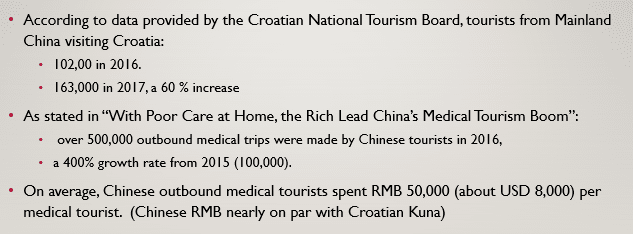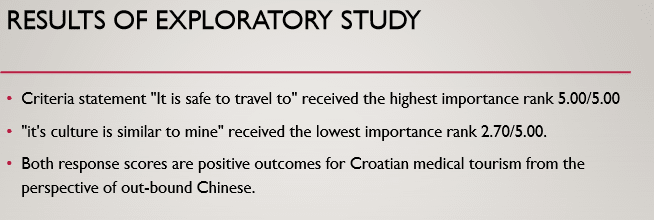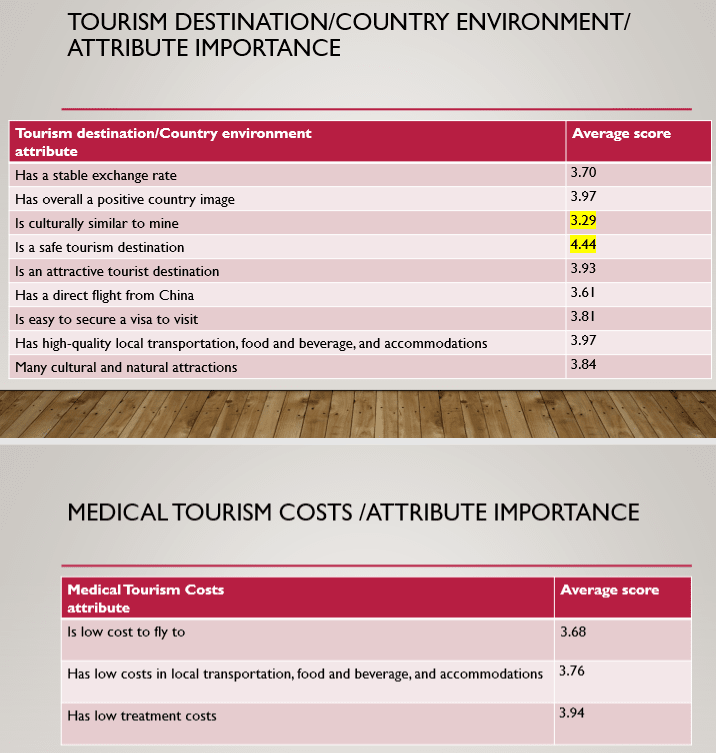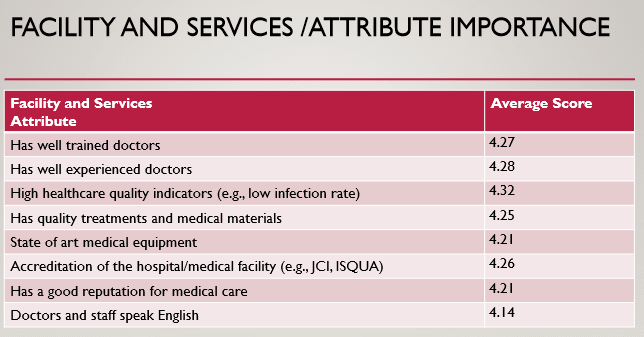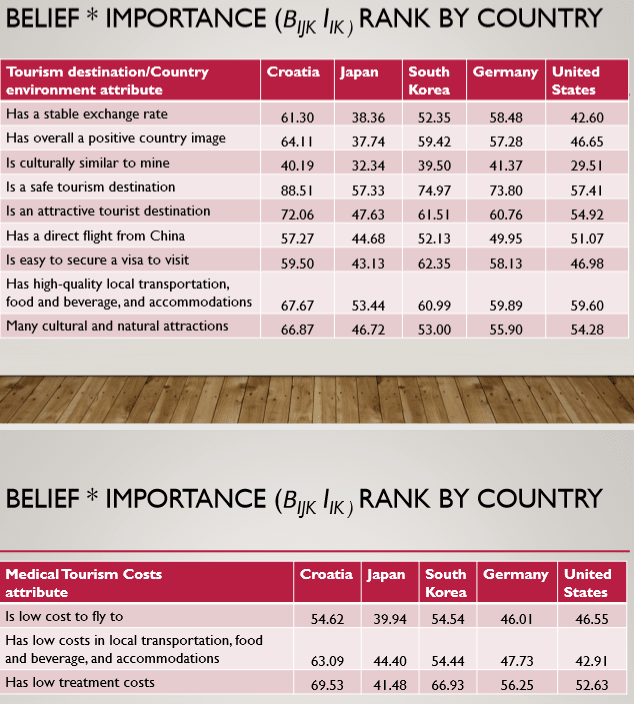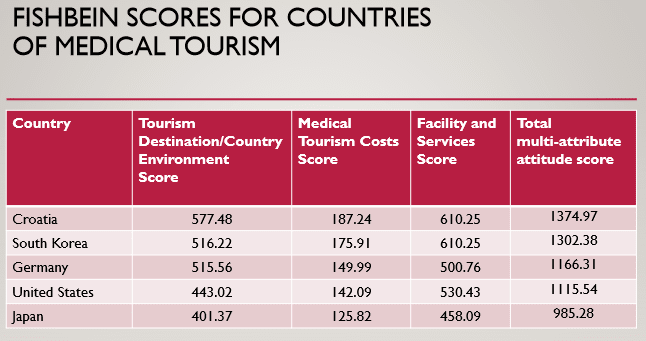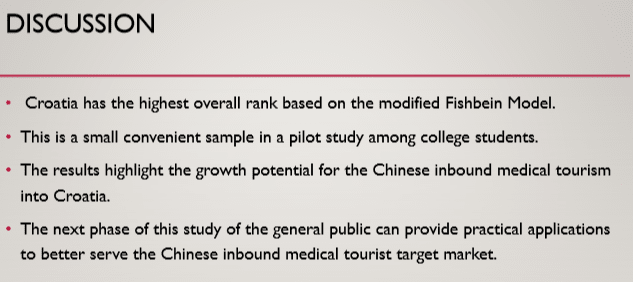'The Healing Garden of Europe': Kvarner Health Cluster's Vladimir Mozetic Interview
November 2, 2021 - The region of Kvarner has a rich medical tourism history and has been described as 'the healing garden of Europe.' Ahead of the 9th Crikvenica International Health Travel conference, which starts on November 4, TCN catches up with the dynamic President of the Kvarner Health Tourism Cluster, Vladimir, Mozetic.
As previously reported on TCN, CIHT 2021 kicks off tomorrow at Hotel Katarina in Selce. One of the most important and prestigious health tourism conferences in the region, CIHT 2021 is the 9th edition of the conference, which is co-organised by Kvarner Health Tourism Cluster. TCN caught up with cluster president Vladimir Mozetic before the conference to find out more about the conference, health tourism in Kvarner, and the direction of Croatian medical tourism.
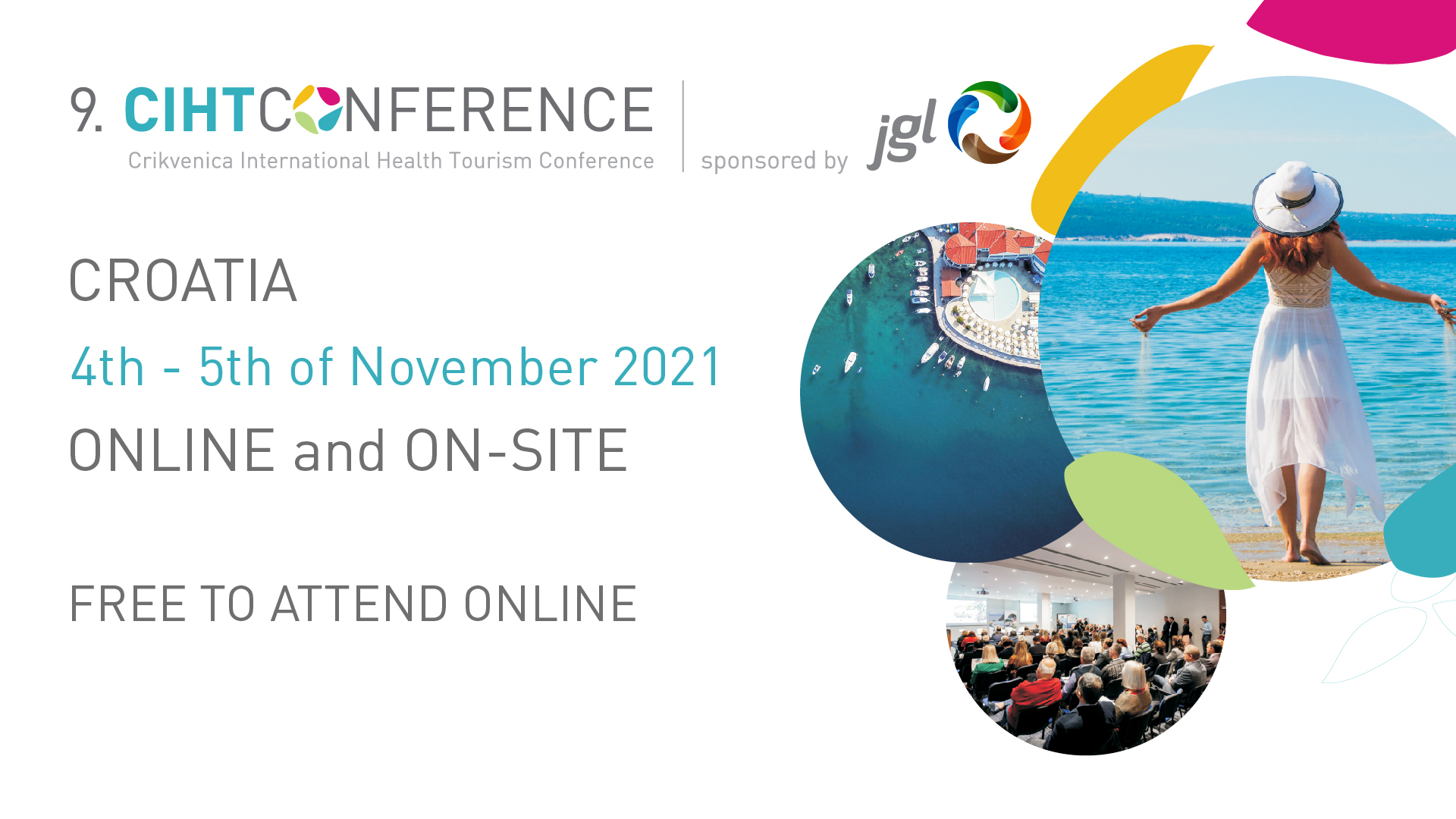
1. CIHT is the most relevant medical tourism conference in Croatia and is now in its 9th year. Tell us how it started, and who is the conference aimed at?
The CIHT Conference was held for the first time back in 2013 on the occasion of marking 125 years of organised health tourism on the Crikvenica Riviera, and then again in 2015 when the Kvarner Health Tourism Cluster also joined as a co-organiser.
The current form of the CIHT Conference is the result of cooperation between the Tourist Board of the City of Crikvenica and the Kvarner Health Tourism Cluster as the organiser, the Special Hospital for Medical Rehabilitation Thalassotherapy Crikvenica and the Terme Selce Polyclinic as co-organisers. The importance of the CIHT Conference has once again been recognised by many. This year, the general sponsor of the 9th CIHT Conference is Jadran-galenski laboratorij d.d., the largest Croatian pharmaceutical company which has earned global success, which is also a member of the Cluster.
Additionally, the Ministry of Tourism and Sport has supported the CIHT Conference for years, as has the Ministry of Health, Primorje-Gorski Kotar County, the Croatian National Tourist Board, the Kvarner Tourist Board, the Croatian Chamber of Commerce, Jadran d.d. Crikvenica and the City of Crikvenica.
Over more recent years, the conference has been attended by several hundred participants, and the lecturers have been eminent experts from across more than 20 countries that are global carriers of health tourism from several continents. The conference is intended for all those who are interested in the activities of organisations and their development, as well as mutual business cooperation in the field of health tourism.
2. CIHT has become known for its ability to attract fantastic international expert speakers. Give us a flavour of what we can expect at this year's event.
This year, the conference was divided into several very interesting panels with 17 outstanding speakers from 9 countries:
1) Medical Tourism From The US Perspective, which will be attended by lecturers from Cleveland Clinic, University of Cincinnati, National Institute of Cancer and Dartmouth-Hitchcock Medical Center. Comparatives and possibilities of cooperation through several areas in the health industry and health tourism will be presented,
2) Competitiveness of The Tourist Destination Through The Diversity of The Tourist Offer with several interesting topics: "Croatia - the land of opportunity", "Croatian tourism and airlines: A missed opportunity?", "Tourism and sport; the advantages of sport destinations'', ''Professional cycling team’s training camps - synergy with destination'',
3) Facilitating Medical Tourism with the topics: "Medical Tourism Stakeholder Management", "Italian Market trends and Bookingsmed", "Rident: Dental Tourism Development and New Challenges", "The Accreditation in Healthcare",
4) New Trends in Medical Tourism that will show the areas: "Fresh and local food in hospitality business - myth or reality?", "Let's Make a World of a Difference", "Game Changer in Health and Wellbeing Holistic Solutions", "Tradition" as a Trend''.
During the conference, a workshop will be held called "Destination Development in Medical Tourism", as will numerous opportunities for B2B meetings, including with 6 facilitators from Italy. Of course, a tour of the health-tourist-gastronomic offer in the region was also organised.
More information about the programme is available here, and more information on how to apply and registration fee can be found here.
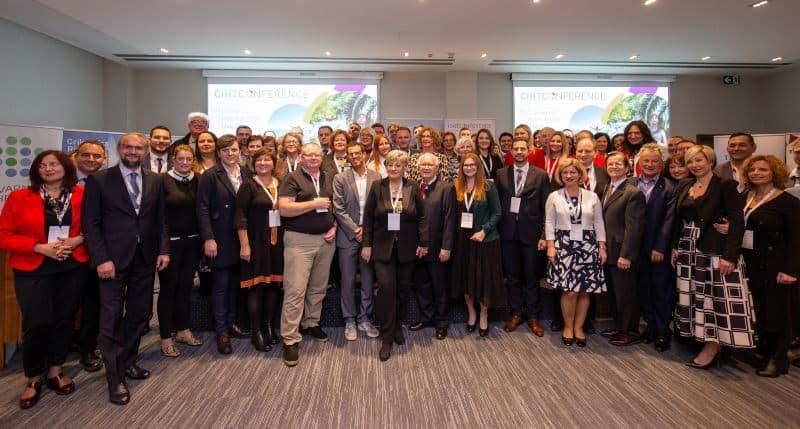
3. Many visitors to Croatia are surprised to find that Croatia is a top medical tourism destination, and the Kvarner region is very much at the forefront of that quality. Tell us a little about the expertise and facilities one can find here.
A possible answer to that lies in one of the projects we're currently working on. Through our regional model, we want to present the criteria by which the region would first be determined by the Destination of Health and Quality of Life. The criteria contain many elements and are also contained in international guidelines; from water and air quality, infrastructure, food, educational processes, health industry products, healthcare quality, COVID-safe protocol quality, accommodation quality, the quality of recreational facilities… This shows the need for cooperation from and of all sectors; public, private, entrepreneurship, scientific-educational, regional and local self-government, and the civil sector. This is a model that can be gradually transferred to the national level. Let's also not forget that investing in the field of healthcare and the quality of life industry enables the raising of the quality and availability of services to our citizens at the same time.
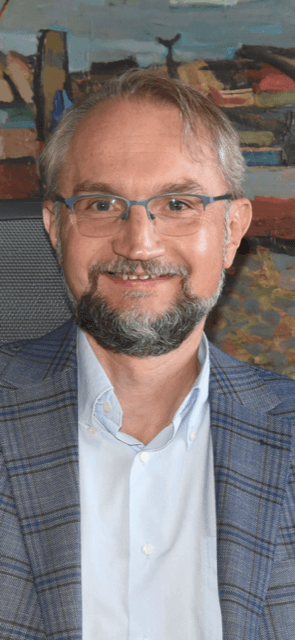
4. The Kvarner Health Cluster is arguably a bigger brand in the medical tourism world than Croatia itself. Who are your members, and what are your core activities?
The Kvarner Health Tourism Cluster is an independent association which was founded back in November 2014. It brings together members from the healthcare sector (medical and dental), the healthcare industry, the tourism sector (tourist boards, agencies and hotel groups) and the scientific and teaching field (components of the University of Rijeka).
Currently, the Cluster has 32 members, with over 8,000 employees, of which almost 4,500 are healthcare personnel. The members are from both the private and public sectors.
With its establishment, activities were started with the aim of connecting all stakeholders in the health tourism and healthcare industry with the quality of the preparation, promotion, development and improvement of their services and products. At the same time, we wanted to take advantage of our location, as well as a large number of high-quality staff within the institutions here, and position Kvarner and the entire county as a destination of health and quality of life.
The main role of the Cluster is to promote our members and our region in the field of health tourism and the healthcare industry, and to connect our members with international partners for a better offer of health and tourism products. This is done continuously through regular participation of our members in congresses and fairs, and through written materials and by using social media.
The representatives of Cluster members actively participate in the work of the Health Tourism Association at the Croatian Chamber of Commerce, in the Association of Private Health Institutions at the Croatian Employers' Association, in working groups of the Ministries of Health, Tourism and Sports related to target areas and in working groups within the Croatian National Tourist Board with the aim of branding tourism and the health industry as significant development industries at the national level. In this way, the activities that should be competitive in the long-term, as well as the therapeutic-rehabilitation segment, both stand out.
It's certain that these services should be accompanied by tourist-accommodation capacities, as well as enabling a longer stay of health-tourist guests with the extension of the season. It's also important to educate staff in the field of health tourism, the promotion of studies in foreign languages, and the use of the results of scientific research projects in the overall offer. The additional implementation of health industry products, along with applications for EU projects are another model of development.
The Cluster is also recognised internationally, and back in 2016 it won the title of Cluster of the Year in the selection of the International Medical Travel Journal, and in 2018 and 2020 it was in the finals with the national clusters of Malaysia and South Korea, which are certainly some of the world leaders in the field of health tourism. The visibility of our region was further increased by the organisation of the IMTJ Congress in 2017 in Opatija with the participation of over 300 participants from 32 countries spanning 4 continents.
Additional information is available on the cluster website, and on social media.
5. This will be the 9th edition of CIHT. How would you define progress in the Croatian medical tourism industry over that time?
Without a doubt, the more organised approach in the implementation and promotion of the health tourism offer, as well as the legal regulation of the health tourism status that has taken place in recent years, with the involvement of national and regional institutions, and the enthusiasm of service providers have contributed to the gradual progress of the health industry. The intention of the Ministry of Tourism and Sport, and the Ministry of Health, as well as service providers, is to connect stakeholders at the level of the Republic of Croatia.
For example, it is estimated that the pre-pandemic year of 2019, more than 80,000 guests stayed in Kvarner for access to services within health tourism. The vast majority were foreign guests and they were using services in dental medicine, and then in the field of various segments of rehabilitation, and selective forms of diagnostic, therapeutic/surgical procedures. Guests from Croatia's surrounding countries, primarily Italy, continue to lead in arrivals, but there is a noticeable increase in the number of guests from Germany, Scandinavia, Great Britain and Russia. Other, more distant, markets are also now opening up. The users of services in our institutions, and thus in the region, stay according to the type of medical service they need, from one day to several weeks.
6. The pandemic obviously had a crushing effect on business last year. Are things starting to return to normal? What trends are you seeing?
Although the coronavirus pandemic slowed down planned development, the elapsed time was used to develop new programmes tailored to the needs of these new circumstances. Currently, our members offer twenty-six POSTCOVID rehabilitation programmes, which are offered to both the Croatian market and to foreign markets. The further focus of the Cluster members is directed towards the development and offer of services in preventive and personalised medicine, rehabilitation (physical and mental), so-called "Lifestyle" medicine and programmes which focus on active and healthy aging.
Although our focus is primarily on the surrounding countries (76 million people live within 500 kilometres or a five-hour driving distance, of which 14 million are over 60 years old), we also direct our propaganda towards Scandinavia, Britain, Russia and Ukraine. Research shows that currently 10 percent of EU residents use healthcare services outside of their home countries (about 50 million of them), and those who would like to do the same stand at 53 percent (about 250 million people), and this is an indication that there is no shortage of markets.
More recently, the Kvarner Health Cluster signed a cooperation agreement with the Ministry of Ayush under the Government of the Republic of India, which promotes traditional forms of medicine, yoga and Ayurveda. Communication with associates from China has also continued. We're also in contact with partners from the USA (ACAP-Association of Croatian-American Professionals), through medium-term project activities in the field of health tourism and the health industry.
7. What are the next crucial steps for the development of the Croatian medical tourism story?
Croatia still isn't sufficiently recognised as a destination for health tourism, and in addition to regional developments, the additional networking of stakeholders will be needed at the national level. The fact is that in recent years, and at the national level, there has been increased investment in the organisation, promotion and legislation in the field of health tourism.
Determining priority markets, promoting the types of services we offer, especially in those segments where we have high quality, tradition and resources, and taking advantage of natural healing factors are some of the necessary activities which need to be engaged in. In this way, the activities that should be competitive in the long run in the preventive, integrative, personalised, and therapeutic-rehabilitation segment stand out. These services should definitely be accompanied by other tourist-accommodation capacities, related non-healthcare services, while enabling the longer stay of health-tourist guests. It's also important to educate staff in the field of health tourism, and to use the results of scientific research projects in the overall offer.
The interconnection and action of all stakeholders in health tourism and the health industry, all offering something in the segment in which it is most competent, proves to be a successful model of cooperation, providing health services, promotion on the Croatian market and on foreign markets, the proper organisation of transport and accommodation, and additional non-medical activities (culture, gastronomy, "outdoor activities", "storytelling"…) and content for the service users and their accompaniment.
So, if we jointly accept the health industry, of which health tourism is a part, as a strategic industry, we can interconnect stakeholders in healthcare, the health industry, tourism, science, education and research, and the probability of a successful outcome is higher. Additional activities on destination certification, destination management, the accreditation of service providers, the use of public-private partnership, joint application for EU projects, and the use of comparative advantages and possibilities of individual subregions of Croatia will surely bring us closer to our desired goal. Together we're stronger, more recognisable, more competitive and more credible both to each other and to the end-user.
8. What would you say are the competitive advantages of Kvarner healthcare, and why should patients choose Kvarner?
What was recently published in foreign media probably best describes the comparative advantages of Kvarner and of Primorje-Gorski Kotar County as a whole: "The combination of differences, a touch of the mild climate of the coast and the islands and the fresh air of the continental areas and the sea, and wild vegetation made Kvarner the "Healing Garden of Europe".
Health tourism in our county has a long history that stretches back almost 180 years. In the past in the area of the Opatija Riviera, the first therapeutic procedures based on natural healing factors began to be carried out. In the second half of the nineteenth century, the climatic advantages of our region were recognised in the area of Crikvenica and on the island of Losinj. Opatija has since been celebrating more than 130 years since it was declared a spa city. Tradition and our geographical position are a couple of the reasons as to why health tourism is accepted in our region as one of the most important directions of development.
The spa in Veli Losinj has continued the tradition of providing health services to guests from abroad. The "Terme Selce" polyclinic has been actively present in this area for more than 30 years, and the institutions that provide dental services have been achieving high-quality results for about 20 years now. For many years, most institutions have been continuously investing significant funds in their staff, equipment and premises, as well as in promoting their own services across emitting markets. Top-quality service with an optimal price, and excellent transport connections by land and air are the main reasons for competitiveness.
Marking the health industry, of which health tourism is an important part, as an economic activity of the so-called "smart specialisations" of our region have created quality preconditions for the inclusion of a larger number of business entities, the creation of newly created value and jobs, and the further improvement of service quality for the local population.
For more details about CIHT 2021, visit the official website.
For more details about the destination, check out the TC Crikvenica in a Page guide.
Development of Health Tourism: High Priority for Croatian Tourist Offer
March 25, 2021 - Both the Croatian Ministry of Tourism and Sports and Croatian tourist boards recognised the development of health tourism as a high priority for Croatia.
To discuss the development of health tourism in Croatia, a branch that is becoming one of the more important Croatian tourist products, Croatian Tourism and Sports minister Nikolina Brnjac met with Kvarner Tourist Board director Irena Peršić Živadinov, Kvarner Health Tourism cluster president Vladimir Možetič, and Zagreb Tourist Board director Martina Bienenfeld. As life expectancy and healthy lifestyle trends increase, the value of health tourism grows. The novel coronavirus only made that growth even more rapid.
"Over 80,000 tourists in 2020 visited Kvarner (well-known for Lošinj Island and its hospital for respiratory issues) for health services. Today, many people are recovering from the consequences of the novel coronavirus there," said the Kvarner Tourist Board director Živadinov.
"We have all the advantages for further development of health tourism: a good reputation of health services, qualified staff, natural richness of thermal sources, good climate, and long tradition of tourism," said minister Brnjac. Her goal is to pull Croatia out of the perception of a country only good for the summer season.
Croatia offers health services in wellness and medicine tourism. Health tourism is most associated with the regions of Kvarner, Istria, northern Croatia, and Zagreb, but the goal is to include other regions that have the potential for health tourism and to achieve the goals of a strategy that needs to be accomplished by 2030.
Martina Bienenfeld said that the Zagreb Tourist Board is working on the City's recognition as the centre of medical excellence. She pointed out good traffic connections, a mixture of the Mediterranean and mid-Europe climate, as well as good prices of health services as great advantages of Croatia's capital to the international clientele.
The Health Care Bill and Services in Tourism Bill now allow hospitality and health tourism services in hospitals and medical centres. These legal changes are also significant in attracting further investments in the field.
For more about travel in Croatia, follow TCN's dedicated page.
Croatian Medical Tourism: Great Potential, Collaborate or Die Says Ilan Geva
November 14, 2018 - Another busy week for the emerging Croatian medical tourism industry. Branding guru Ilan Geva gives his thoughts after his latest visit to Croatia.
It has been quite a week for the Croatian medical tourism industry. Keith Pollard, Editor in Chief of the International Medical Travel Journal, in an interview with TCN, talked about the Croatian potential, as well as assessing that the country could take 25% of the Hungarian dental market 'if Croatia got its act together'; Sherene Azli, CEO of the Malaysia Healthcare Travel Council, which runs the best medical tourism in the world in Malaysia, was in town to explain how Malaysia does it; and global branding guru Ilan Geva was in Croatia for a week, both as a speaker at CIHT 2018, having already performed a special workshop for industry professionals on branding Croatian health tourism in Zagreb. TCN caught up with Ilan after a busy week.
1. You have just spent a week in Croatia, your latest visit since your first 10 years ago, and you held a specialized branding workshop with industry leaders, as well as performing as a keynote speaker at the 6th Crikvenica International Health Tourism conference organized by the Kvarner health cluster. How was your week, and what did you learn?
Every visit to Croatia is a good one for me. I simply like to come here, and get involved in knowing the healthcare providers, visit the hospitals and clinics, and mingle with the movers and shakers of the industry. I always see another angle in my visits, sometimes I focus on one single client, and sometimes I have the time to spend on my own and observe. This last week was indeed intense, since 4 out of 6 days on the ground I was presenting to audiences and following up with conversations.
It is clear to me that the Croatian medical tourism industry is now on a crucial crossroads. There is lots of work to be done. I learned that not everyone agrees on what to do and how to do it. And I came to a very simple conclusion, Croatians must build a national brand for the emerging medical tourism industry.
They must decide which government office supports the effort (only one!) and they must have a sense of urgency, there is no time to waste, the competitors are not waiting.
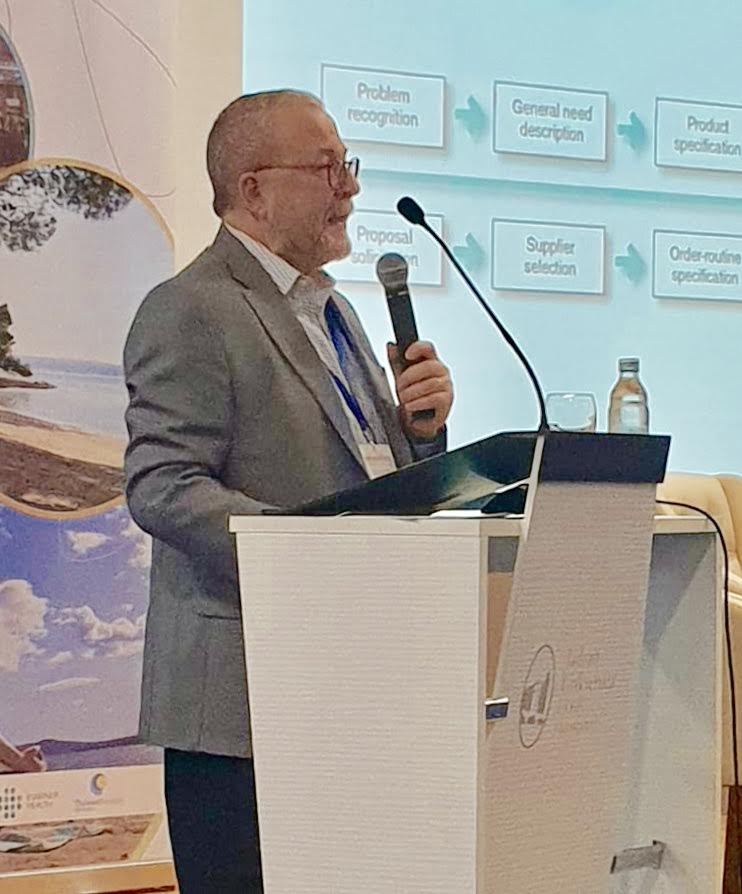
2. You first came to Croatia back in 2008 to help a dentist in Rovinj. Tell us about that, and how the Croatian medical tourism story has progressed since then?
Back in 2008 the entire concept of medical tourism was in its infancy, as far as organized business category. Many providers felt that it is enough to just have a nice clinic and people will show up. There was absolutely no data, information, or anyone to learn from. The wonderful doctor in Rovinj was indeed a very competent doctor, and has presented new treatments in stem cell therapy, but he was a bit naïve. He believed that if he will give me a budget of $400 a month, I would be able to send him 200 patients a year from the U.S.Mathematically this is so improbable, that I saw no point in continuing the conversation. He basically offered me $24 per patient delivered!
And I am not even a facilitator, I am a brand builder and a marketing professional. The situation now is a bit different, but one of the most common sentences I hear in Croatia (as well as in other Eastern European countries) is the sentence: “We have no budget”. That has to change immediately. No one gains anything with no investment. I heard that there is actually money being spent already, the question is who spends it, on what, is it transparent, and does it deliver a clear benefit to all Croatian medical tourism practitioners. Some people complained that the Zagreb Tourist Board has commissioned an American association to do a research, or feasibility study well over a year ago paid a six-figure amount (in U.S. Dollars) and yet no one has seen anything. That doesn’t contribute to the effort of building a consensus and collaboration in this industry.
On the other hand, the overall situation progressed a lot because these days there are extremely successful hospitals and clinics in Croatia, and the awareness is starting to build up, mostly by word of mouth.
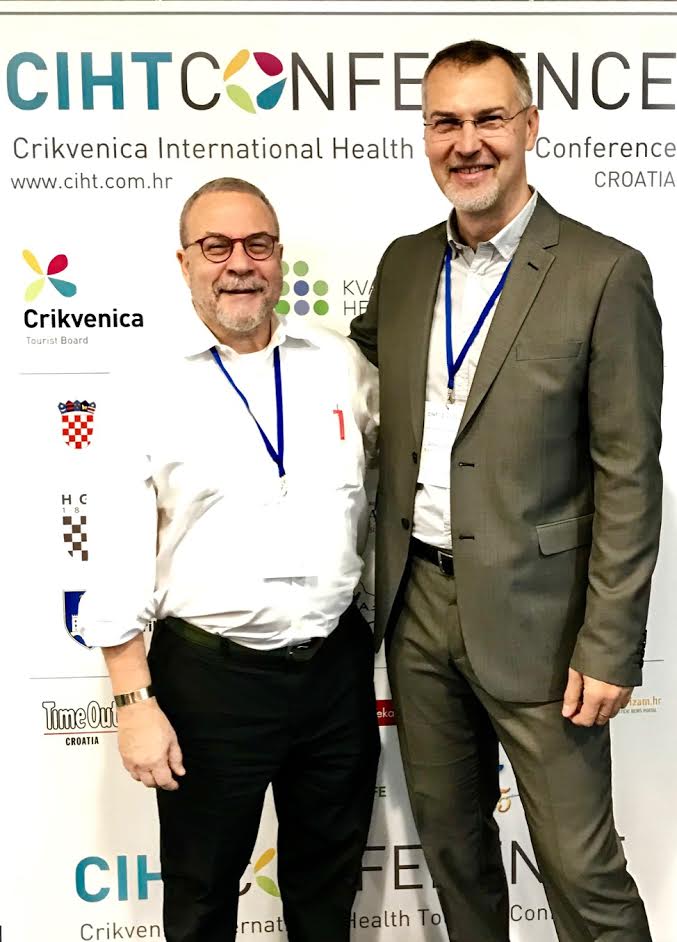
3. One of the key messages of your workshop was the need for all the stakeholders to come together, in a way that Malaysia has managed so well. Give us your vision of the stakeholders involved in getting the momentum behind the promotion of Croatia as a medical tourism destination.
The main lesson I learned from my travels and visits to medical tourism destinations and hospital inspections: Collaborate or die. Malaysia was no different from Croatia, they had to face the decision of being serious about the business, or just being a bunch of hospitals competing with each other. A bunch of hospitals competing with each other doesn’t help any country in creating a solid brand for its medical tourism industry.
Thailand, The Philippines, Israel, Greece and others have some few excellent hospitals. But in fights, inaction, political battles and “lack of budget” kill the opportunity to become a global brand in medical tourism.
Malaysia overcame the obstacle of politics, budget allocation, and legal implementation and made sure that all stakeholders know exactly what they are supposed to do within the medical tourism activity. Clear, transparent and efficient. Croatia is still miles away from that situation. Building a national brand is impossible under these circumstances, because there is no brand…only a bunch of providers spread all over the country.
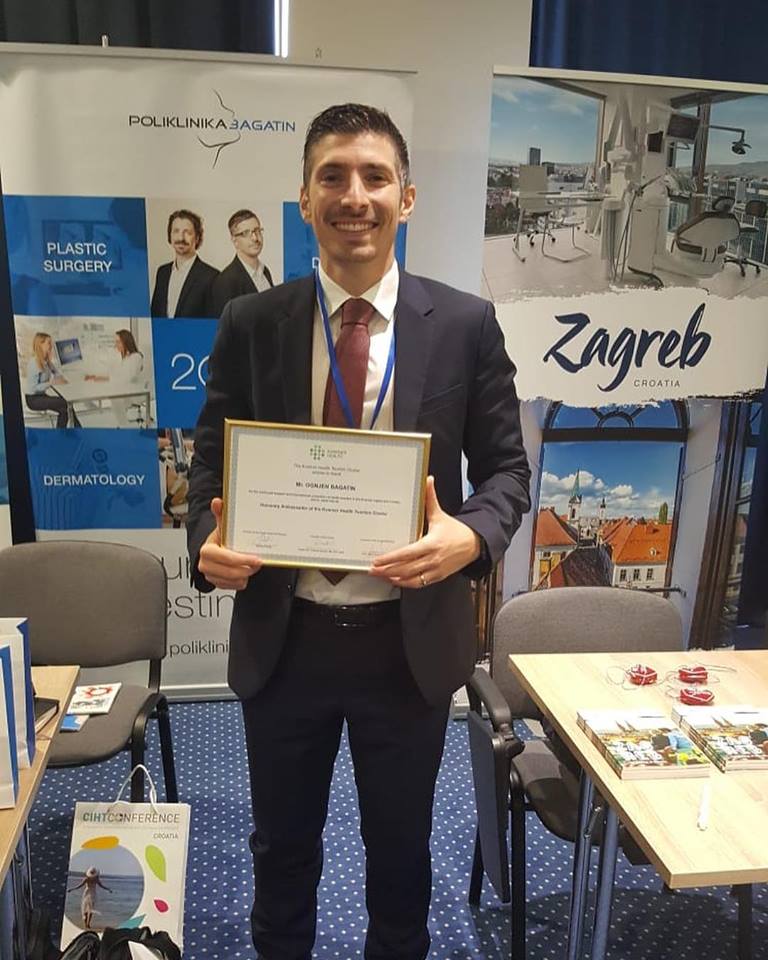
(Ognjen Bagatin of Bagatin Clinic, one of four Croatian clinics Ilan Geva singles out for Croatian medical tourism)
4. You travel the medical tourism globe, and have done for many years. Many Croatians will be surprised to hear that its medical tourism industry has such potential. Paint a picture of that potential, who are the key players in it, and where does Croatian medical tourism stand now, and where could it be in 10 years?
I will name only four businesses that are in the “Premier League” of medical tourism in Croatia: St. Catherine Specialty Hospital, Poliklinika Bagatin, Terme Selce and Svjetlost Clinics. They are each specialists in a separate area, and they are all extremely successful at what they do. They are also aware of the power of brand building, marketing excellence and delivering superb customer satisfaction. There are many other great clinics spread around the country, primarily in tourist destinations, such as Istria, Dubrovnik, Split etc. but they do not have the mass needed to build a global clientele.
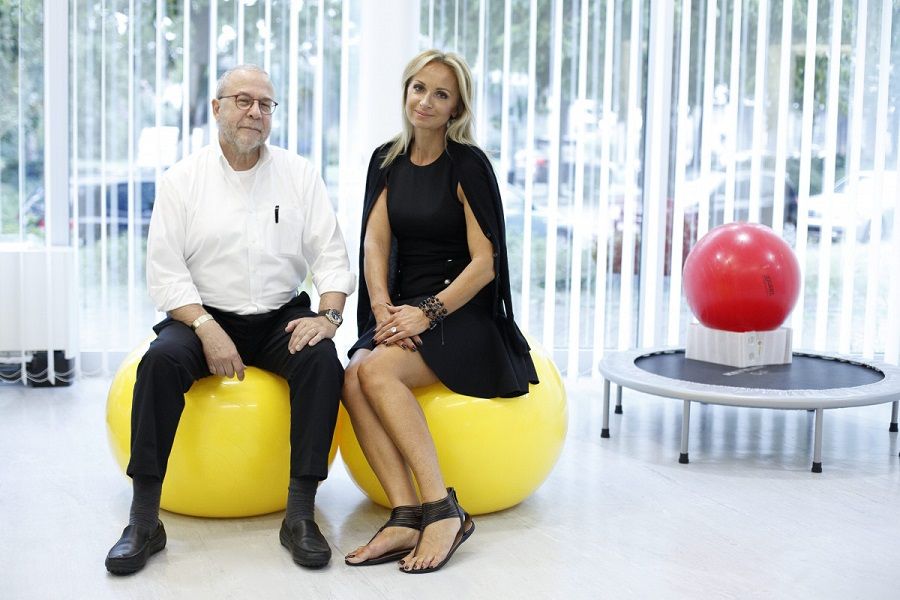
(Ilan Geva with Jadranka Primorac from St Catherine Specialty Hospital)
5. One of the things I learned this week is that the brand of the Kvarner health cluster seems to be stronger than that of Croatia in the industry. What are your thoughts on that?
What I love about the Kvarner Health Cluster is the fact that they are all about initiative. They are a good example of an organization that is trying to do the best for all its constituencies, and lift them all to a higher level. I personally don’t know if the Kvarner brand is more prominent than any other brand in medical tourism, but I also know that Croatia has no national brand in medical tourism…Simple. Croatia has a very strong brand and brand awareness in sports, but not in any medical institution, medical university, research facility or breakthrough innovation. Some of the brands I mentioned above have parts of this reputation, but not the country as a unique entity.
If you ask today anybody in any European location “What is Croatia know for”, I am willing to bet that no one will say “Excellent medical treatments”.
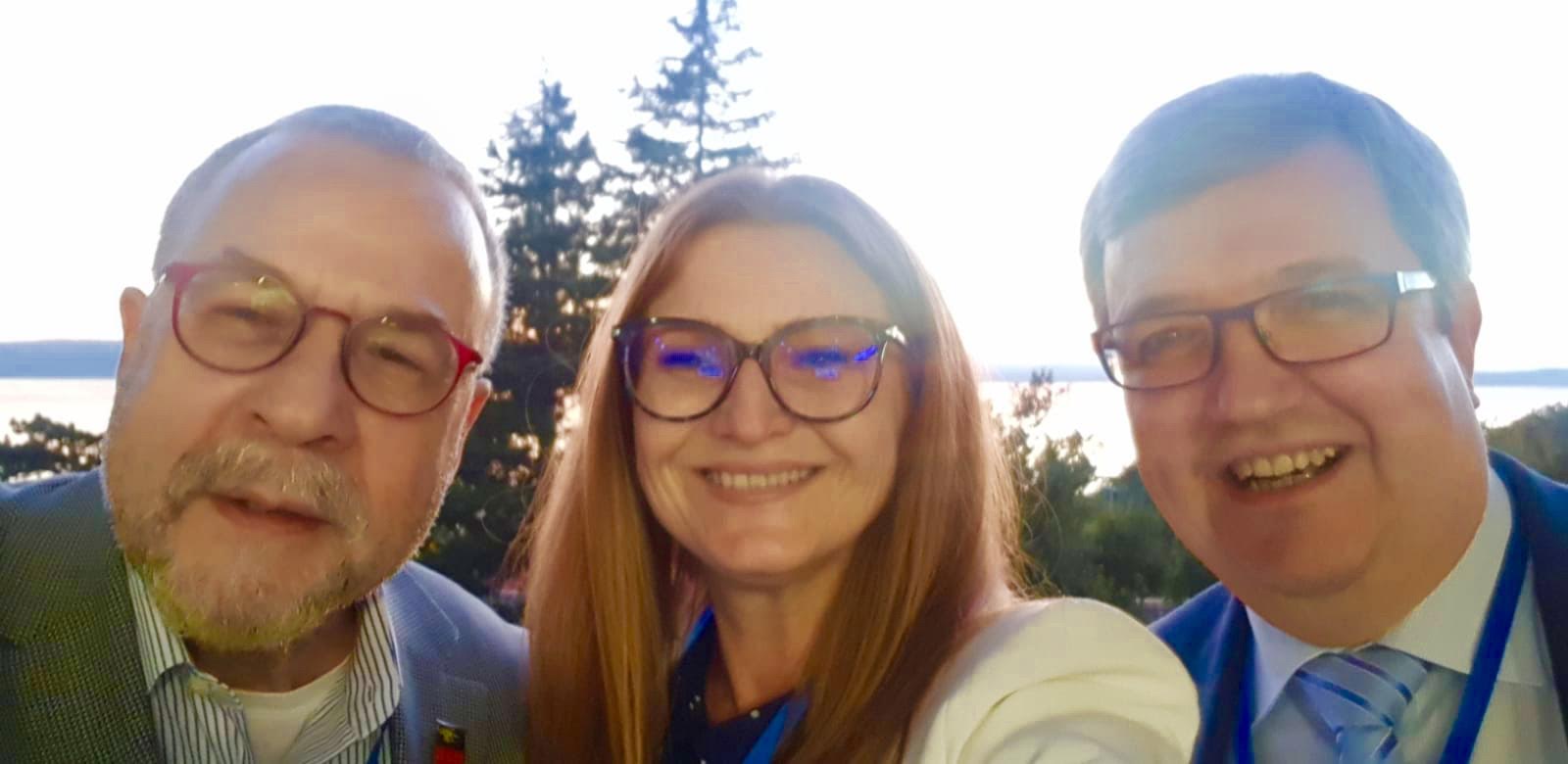
6. Which markets do you think the Croatian medical tourism industry should target, and why?
Draw a circle around Zagreb, which represents up to 5 hours flight, and that circle may include the potential market for Croatia’s medical tourism market. Anything else will be a surprise for me.
7. As a frequent visitor to Croatia with an interest in health tourism, give us a paragraph on the potential healthcare and tourism experience which awaits patients.
This is a very broad question. But I will try to answer it via some examples. First, Croatia does have a brand in the tourism industry. The visitors to Croatia know that they can expect a beautiful clean and pristine country, with amazing sights, fantastic food, and very nice people. That is hospitality, and Croatians are known to be wonderful hosts. But even in this category, there are already voices that warn people not to show up in Dubrovnik at the height of the season, because the place is too small to contain all the visitors, and the level of service is deteriorating…Some of the great generosity and professionalism Croatians display in tourism is also evident in medical treatments. But the country does not have certain standards that will welcome patients in every location across the country. The customer experience might vary, and that is a danger when going forward.
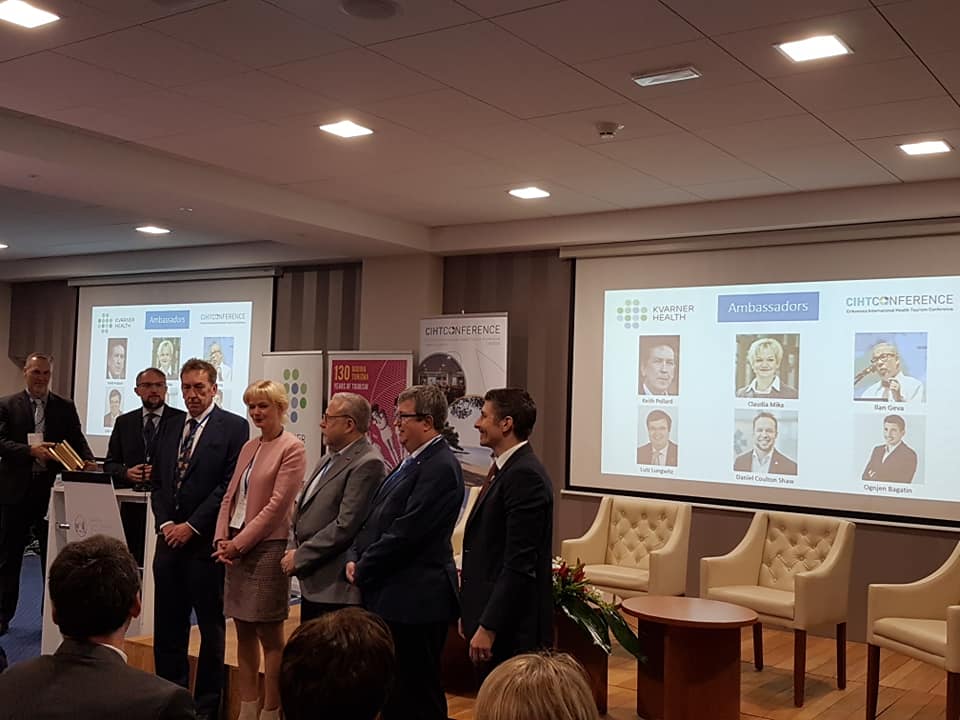
(Ilan Geva was among the nominated ambassadors by the Kvarner Health Cluster in Crikvenica at CIHT 2018)
8. You were given a special recognition in Crikvenica at CIHT 2018, as one of the conference ambassadors, and you were given an extra gift at the end - a Luka Modric shirt. Tell us about that and the hospitality you received in Crikvenica, where you were clearly very at home.
The truth is that I was booked at another conference in Korea at the same time the CIHT conference took place. Suddenly, that conference was cancelled, and I was joking with Vladimir that I will come only if he will give me a Luka Modric official team shirt…Little did I know that he would take it seriously. I am actually glad he did! I was betting with all my friends in Chicago that Croatia will make it all the way to the finals, and they all laughed at me…they simply don’t know the grit of the Croatian people. If Croatians will demonstrate the same team spirit and determination in Medical Tourism, as they did in the World Cup, nothing will stop them!
My last visit to Crikvenica was the fourth one, and I enjoyed all of them, even in the winter. I know from personal experience that the people are extremely generous, professional and very welcoming. I also know from personal experience that as medical professionals they are good, very good.
Now what we have to do is make them famous around the world, and position them as the right people in the right place.
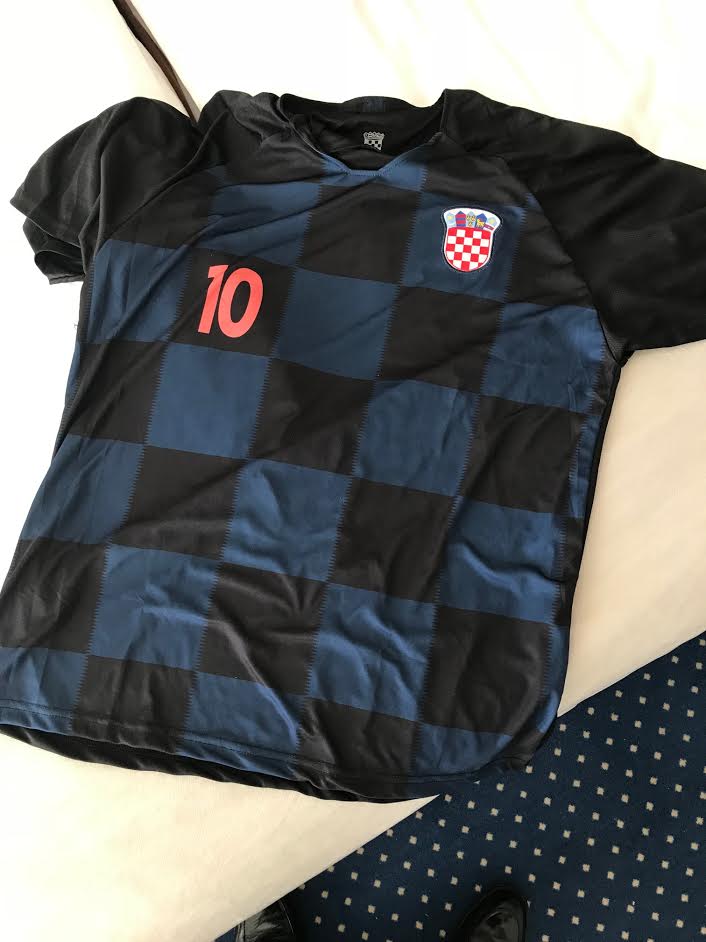
(The Luka Modric shirt...)
To learn more about Ilan Geva, check out his official website.
To follow the latest from the Croatian medical tourism story, click here.
Safe Croatia: Understanding Chinese Perceptions of Croatian Medical Tourism
A fascinating pilot survey in China by a New York university at the 6th Crikvenica International Health Tourism Conference on November 8, 2018 opens up an intriguing possibility for Croatian medical tourism. Small steps, but ones worth following up.
The more I get involved in the Croatian medical tourism story, the more fascinated I become. And the more I become convinced that Croatian medical tourism is the single most important sector for Croatia to be investing its time and marketing in. With so many competitive advantages, as we have previously discussed, the only thing that is holding Croatia back from this potentially billion-dollar industry, is local cohesion, a brand and a strategy and roadmap of how to get to the next level.
Yesterday, we touched on the views of various international participants of the conference, which included 18 high-quality speakers, all experts and market leaders in their medical tourism fields. You can read that article here, an article with a Malaysian feel after Malaysian Healthcare Travel Council CEO Sherene Azli's eye-opening presentation on how Malaysia became the number one medical tourism destination in the world. We will publish an interview with Sherene shortly.
Although I knew that the Kvarner health cluster was the most progressive body in the emerging Croatian medical tourism industry, I will confess to being more than stunned at the quality of the speakers - both Croatian and international - as well as some of the very niche topics which were presented. Professor Christine A. Lai, from the State University of New York Buffalo State, for example, with a presentation entitled Understanding Chinese Perceptions Toward Croatian Medical Tourism.
Niche indeed...
And fascinating.
The potential of the Chinese medical tourism market had already been touched upon during the Malaysian presentation, as Sherene pointed out some of the regional opportunities for Malaysia. With changes to China's infamous one-child policy, there are now apparently over 40 million Chinese women over 40 (as I understood it) interested in IVF treatment. If Malaysia could position itself as the regional leader in that industry, Malaysia's already booming health tourism industry would boom even more. But how could there be an opportunity for Croatian medical tourism with Chinese patients?
I sadly missed the opening of Professor Lai's presentation as I was interviewing Sherine, but as I understood things, Professor Lai's academic connections to China enabled a very limited modified Fishbein survey on perceptions of medical tourism destinations around the world. The sample size was small and very educated (young students), so there is no suggestion that this is a definitive study, but rather perhaps a seed worth planting to see if it could turn into something very solid indeed. As Professor Lai's slides showed, Croatia is being discovered by a greater number of Chinese each year.
South Korea, Germany, USA, Japan and Croatia were included in the study. The most important factor in the study for Chinese respondents? Safety. One of Croatia's strengths. Croatia, Full of Safe Places. Maybe time to make more of the branding of Ivan Vucetic from Hvar, the father of dactyloscopy...
So what are the attributes which are most important to this small educated Chinese sample? Scores above out of 5. Safety.
And from a medical tourism point of view? The requirements were understandably more stringent.
And then the big shock. Taking into consideration all the factors from safety to price in Japan, South Korea, Germany, USA and Croatia, there was only one clear winner - Croatia. And look how strongly Croatia performed on safety.
A summary of the scores.
It is too early to start building clinics in Zagreb and beyond for millions of incoming tourists to the Croatian medical tourism industry, but it is not too soon to start taking the findings of this very small sample and expanding it to see where this might lead. The perception of 'safe' in this increasingly troubled world, combined with strong medical reputation, great prices and a strong tourism offer, could well prove to be quite a bonanza for the Croatian medical tourism industry.
The Croatian National Tourist Board opened an office in Shanghai last week. One of the lessons from Malaysia which I will be looking at in my interview with Sherene Azli is the use of all Malaysian institutions to promote the medical tourism industry. The Malaysian Healthcare Tourism Council only has two offices abroad (from memory in Vietnam and Indonesia) - all the rest of the marketing is done through the network of offices of the Malaysian Tourist Board.
Imagine the same happened in Shanghai. Croatia, the safe European destination full of tourism, but also a destination for high-quality, affordable medical tourism.
Croatia could hit its goal of becoming a 12-month tourist destination quicker than planned if it plays its cards right.
The time for a big push on Croatian medical tourism is now.
To learn more about the Crikvenica International Health Tourism conference, click here.
To follow the latest on the Croatian medical tourism industry on TCN, click here.
Malaysia Shines at CIHT Kvarner Health Tourism Conference in Crikvenica, Croatia
November 8, 2018 - How Malaysia became the world's best medical tourism destination, lessons in branding Croatian health tourism, and much more in an outstanding first day of the Kvarner Health Cluster CIHT conference in Crikvenica.
I had known in the back of my mind somewhere that the Kvarner health cluster was doing an amazing job at promoting health tourism on the northern coast of Croatia, but it was only today that I fully appreciated quite how well they were doing. An email exchange with leading global medical travel branding expert Ilan Geva recently led me to attending his specialised workshop on how to brand Croatia as a medical tourism destination in Zagreb earlier this week, and he filled me with enough enthusiasm and curiosity that I found myself on the road at 6am this morning - destination Crikvenica for the Kvarner health cluster's 6th Crikvenica International Health Tourism Conference at Hotel Omorika overlooking the Adriatic Sea. The conference, also supported by local regional and national bodies and tourist boards, included representation from the Ministry of Health, Ministry of Tourism and Croatian National Tourist Board.
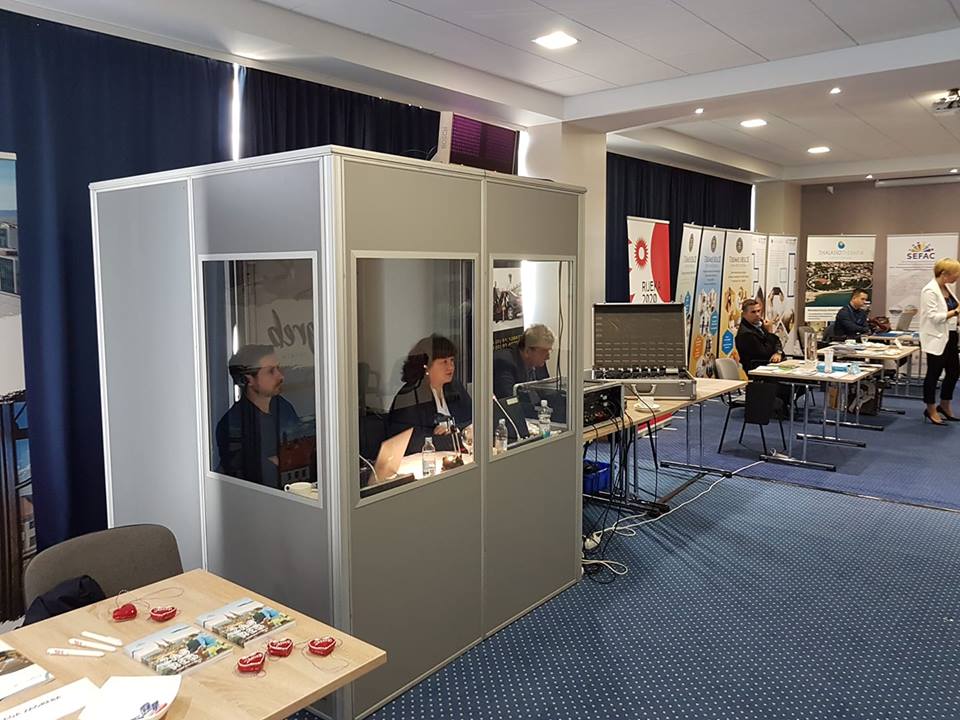
I have attended a number of conferences in recent months in Croatia, and there were so many aspects of CIHT that really caught the eye, once one had devoured all the superbly presented information on the event website, including welcome video messages from four key international speakers. There are 18 international speakers in all, experts in their field back in their native countries, and each with some expertise to share to help the Kvarner health cluster and medical tourism in Croatia learn and grow. One of my favourite details - simultaneous translate available in both English and Croatian (speakers spoke in different languages - see photo above) - although I didn't use the service, the speed with which the panelists answered questions indicated what a high-quality job the interpreters were doing.
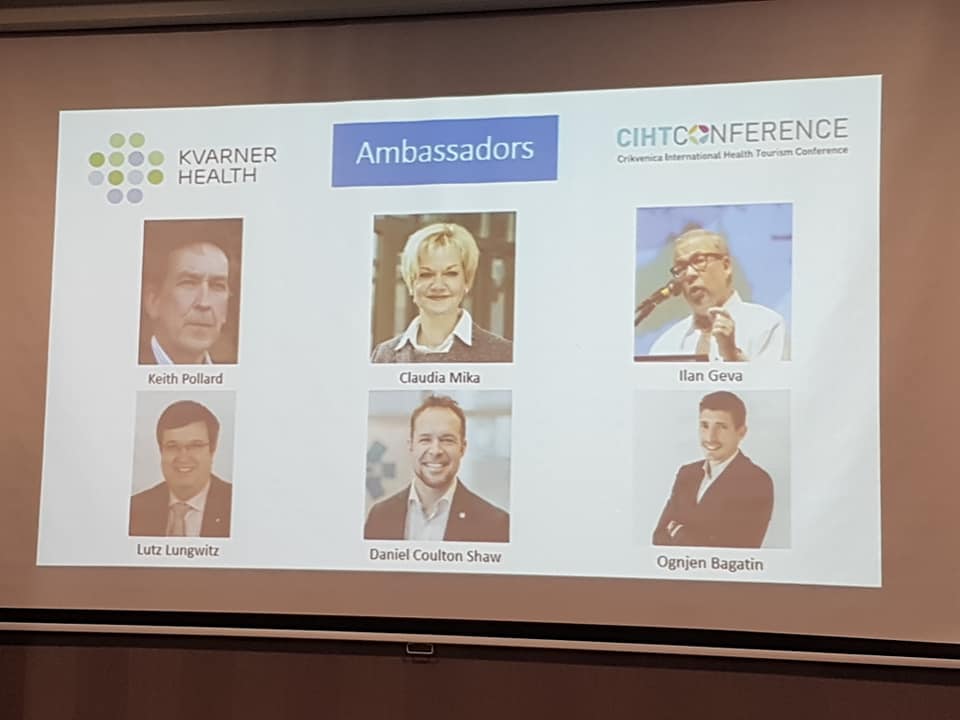
The high-quality nature of the international expertise was perhaps best illustrated after the introductions, as the Kvarner Health Cluster made a presentation to its six ambassadors in recognition of their work.
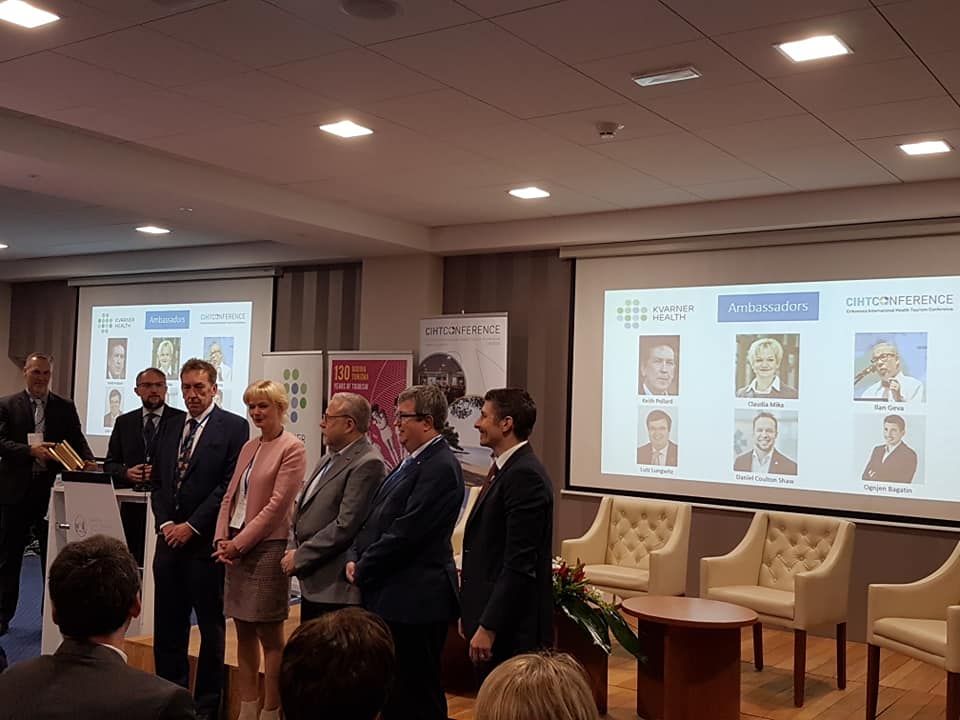
Keith Pollard, Editor in Chief of International Medical Travel Journal (IMTJ), Claudia Mika, founder and CEO of Temos International in Germany, Lutz Lungwitz, President of the German Medical Wellness Association, Daniel Coulton Shaw, co-founder of Global Clinic Ranking and Smile Clinic Slovakia, Ognjen Bagatin, CEO of Bagatin Clinic in Zagreb, and Ilan Geva. Geva was put to the back of the list for the presentations, as he was given an additional gift - a Luka Modric football shirt, which he had jokingly requested previously. A nice touch.
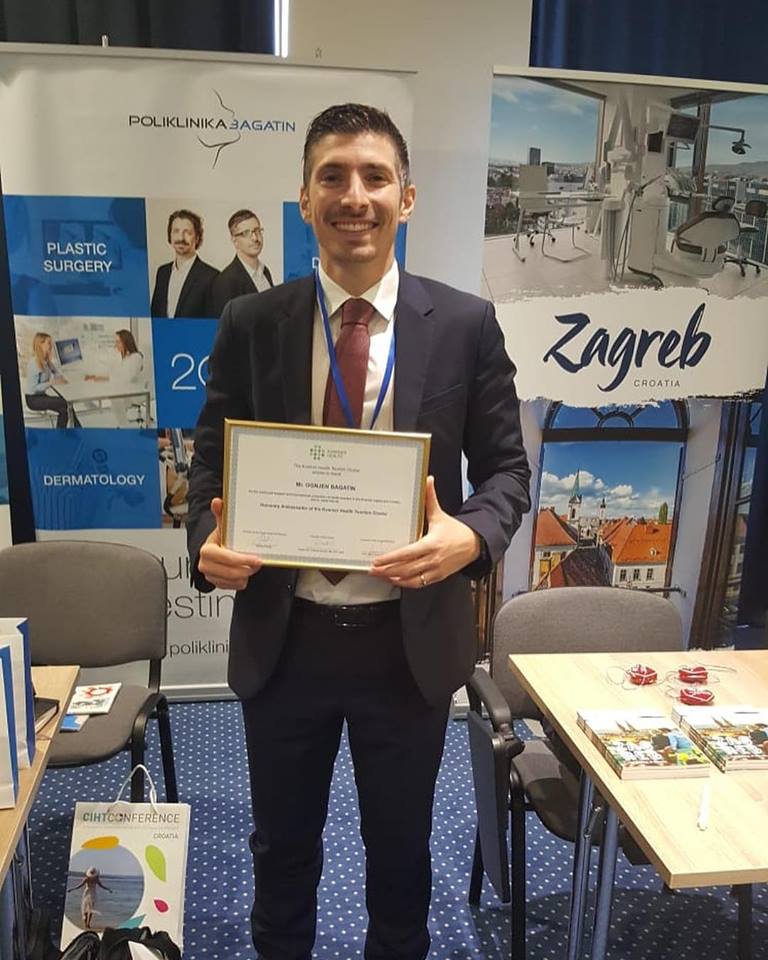
It was particularly pleasing seeing young Bagatin get recognised for his efforts. There is no more avid - or effective - promoter of medical tourism in Croatia today, and his tireless travelling of the globe and local lobbying to move the story forward has placed his as the key person in developing the Croatian medical tourism story.
With such a star-studded lineup, I was expecting some great information and presentations, but I was not quite prepared for what followed. Malaysia has been named as the best in medical tourism travel for several years in a row, and Sherene Azli, CEO of the Malaysian Healthcare Travel Council was on her second visit to Croatia to explain how they did it. It was perhaps the most impressive presentation I have heard in my time in Croatia - of how to make an industry go from nothing to the world's best in just a few short years. And I was not the only one who was absolutely stunned at the Malaysian approach and cohesion of all the major stakeholders; I overheard one of Croatia's most successful clinics (I will not mention which) approach Sherene after the presentation, gushing with praise at the achievement, and lamenting the fact that such togetherness could be achieved elsewhere but not in Croatia.
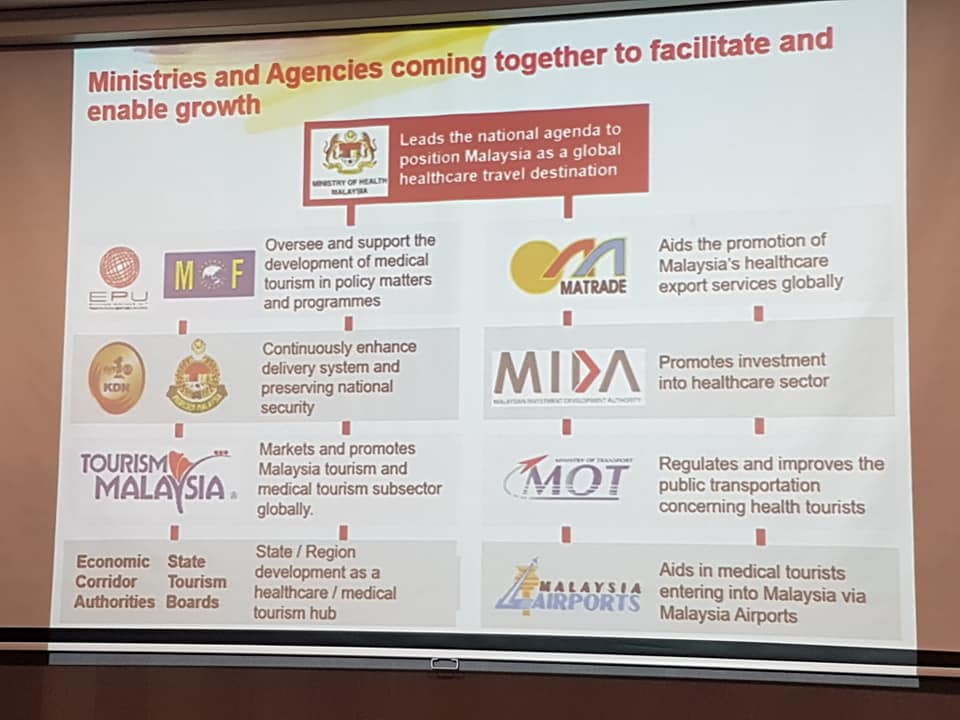
Sherene kindly gave TCN an interview in the November Crikvenica sunshine, which I will publish in full in the coming days. It is quite a story, but I leave you for the moment with two things - the slide above listing all the major stakeholders who are all working as one, with Sherene coordinating all. About 90% of her job is managing the stakeholders, but 100% unity of the relevant institutions from marketing to arrival at the airport. A dedicated medical tourism waiting lounge is the first contact, which includes a transfer to the clinic. And the second teaser for now - take a tour of the Malaysian medical tourism experience in the official video below.
And then perhaps the nicest moment of the morning session of the first day of this Kvarner health conference - a thank you to Croatia from Sherene not only for some thoughtful hospitality she had never encountered in 60 other countries she has visited, but hospitality which showed her how Malaysia could improve its service and hospitality thanks to her experience in Croatia.
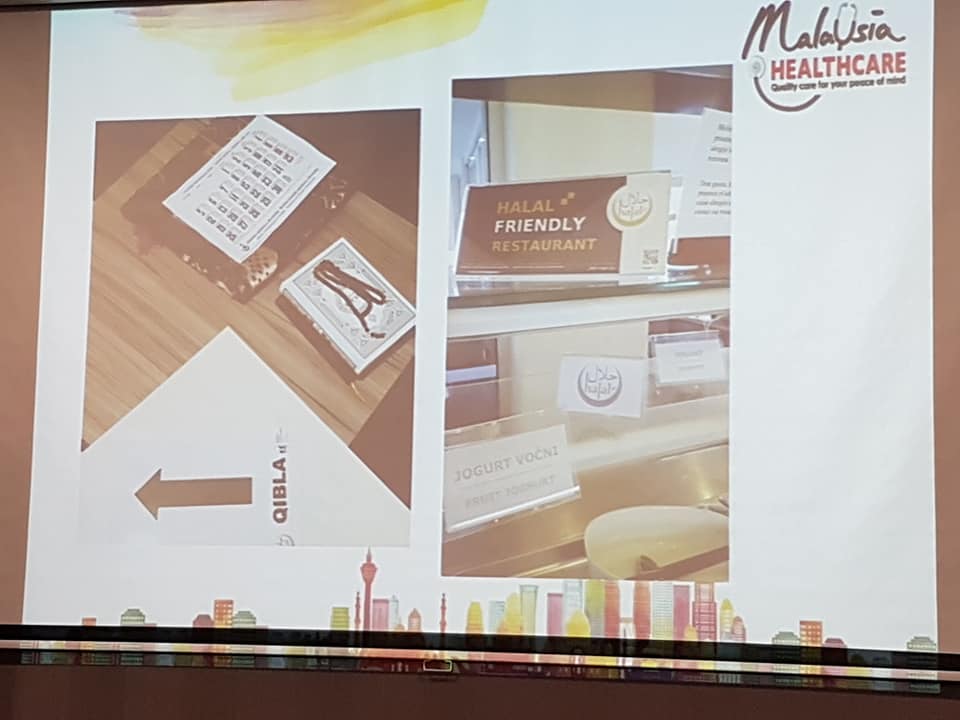
I am probably the only Muslim in the room, she said, as she showed us a slide of two tiny details that made her feel truly welcome and that had never happened anywhere else. On the left, prayer mat, qibla and Koran which she found in her room, on the right Halal breakfast options.
"I have only come across this halal option once before on my travels," she said. "At the Zagreb Hilton last year."
Well done Croatia. Those little details make a big difference.
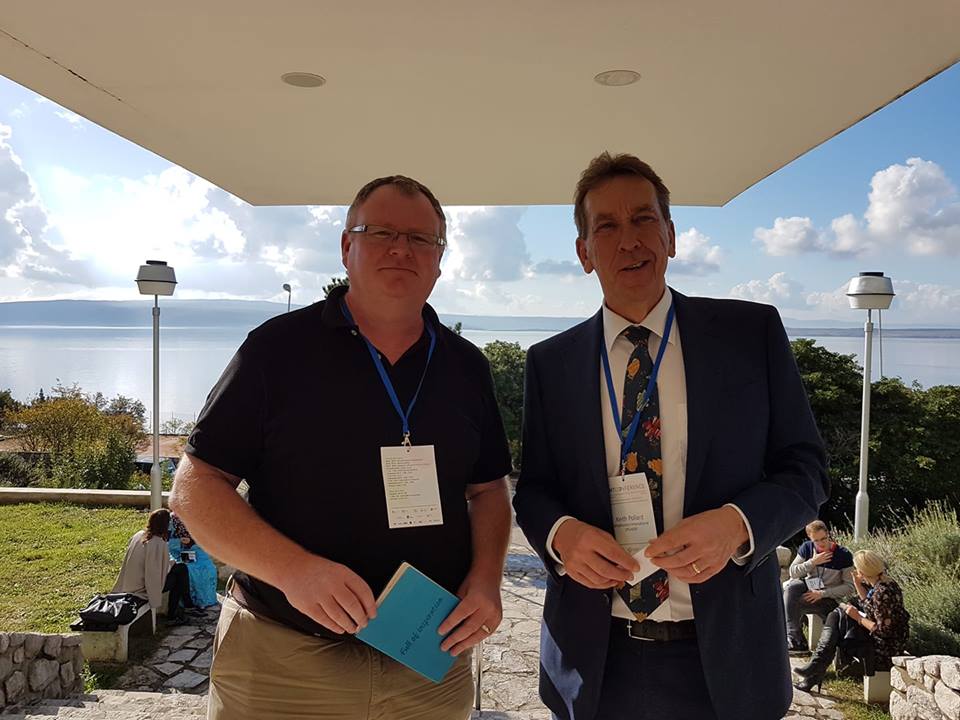
Sherene was not the only fascinating speaker. The first morning session consisted of the following:
Is Kvarner health a tourism destination following the EU scenarios for health tourism development? Milena Persic, Full Professor at the Faculty of Tourism and Hospitality Management in Croatia.
Developing a medical travel strategy for a hospital or clinic. Keith Pollard of IMTJ. Keith, pictured above right, is a fellow Brit and also kindly gave an interview on the potential of Croatian medical tourism, one which I will also publish shortly.
How to use TRUST in building the brand of your country, hospital, and people. Ilan Geva from the United States.
Understanding Chinese perceptions towards Croatian medical tourism: a Fishbein model based on competitive analysis. Christine A. Lai, Professor at the State University of New York Buffalo State, USA.
University Eye Hospital Svjetlost - from a single practitioner office to an international chain of eye care centers. Ivan Gabric from Eye Hosptial Svjetlost in Croatia.
A global patient stream turning online - the key ingredients to grow your patient base. Martina Viduka, Clinic Relationship Manager of Qunomedical, Germany.
France Surgery - the key to success. Carine Briat-Hilaire, CEO and Co-Founder of France SURGERY, France.
Development of international cooperation in the Lublin Medicine Cluster in the field of scientific research and innovation in medicine, health, and education. Dariusz Matosiuk, Vice-Rector for science at the Medical University of Lublin, Poland.
Quite an international field, with some truly fascinating topics, even for a non-medical person such as myself.
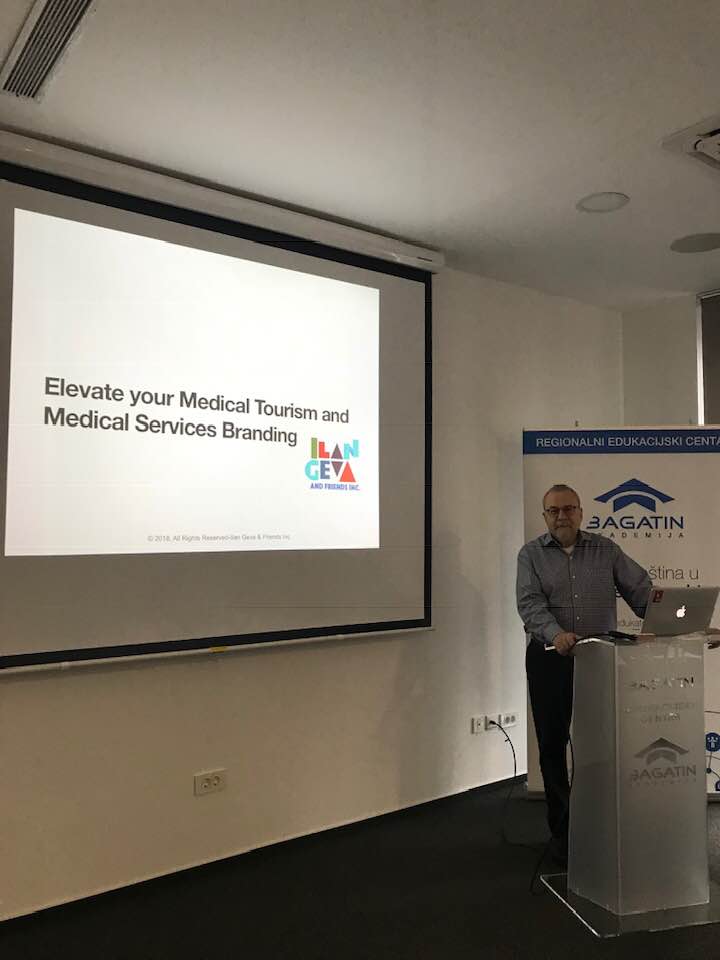
(Ilan Geva at the Bagatin Clinic Croatian branding workshop in Zagreb earlier this week)
"Tell us a little about the branding of Croatian medical tourism from an industry perspective, and how can it be improved," I asked the first panel from the audience.
"Croatia doesn't have a medical tourism brand. Period. I told you I am direct, but that is the truth. It has GREAT potential. It has some brilliant businesses such as Bagatin, which are doing incredible things, but private businesses cannot brand a country. The politicians need to provide the legislative framework for medical tourism to operate effectively. Then they need to set a budget. Then they need to get the hell out of the way and let the professionals deliver."
It was a theme echoed by Svjetlost's Ivan Grabic, whose frustration with the lack of national branding and promotion was not hard to detect. I asked him what he would do with a blank paper and pen and a mandate to deliver medical tourism in Croatia. He was extremely candid - and smart. Bring the clinics together to agree what they can offer. Then go to the government and involve the official stakeholders, for only the State can create a country brand, not a private company. Then agree a budget, which is where the fun begins. Gabric said that for every euro spent on marketing his eye clinic, he knows he will get 15-20 euro of business. Creating a Croatian medical tourism brand will not only take time to be successful (several years for France Surgery and the Malaysian Healthcare Travel Council), and so it will be seen as a shot in the dark with no immediate results. And that's where things break down with official cooperation and funding.
So the current state of the Croatian medical tourism industry, which has the potential to bring in BILLIONS to Croatia is this (from this Englishman's perspective):
1. The biggest brand for health care in Croatia does not mention Croatia - it is Kvarner health.
2. The biggest advocate of Croatian medical tourism is one private clinic in Zagreb (and soon in Split) - Bagatin.
3. Some of the best eye surgery (and probably the best for quality and price) in Europe is to be found in Zagreb and 6 other locations in the former Yugoslavia - Svjetlost.
4. There is a hospital in Zabok which is the exclusive partner of the world's best hospital, Mayo Clinic, on a new healthcare initiative - the OneOme RightMed pharmacogenetic test - which can save hundreds of thousands of lives a year and save hundreds of billions of dollars.
5. ALL the international medical tourism experts agree on the potential of health tourism in Croatia. And ALL the experts say the next step is for all the stakeholders to work together to make that happen.

Here is Sherene's slide on how Malaysia did it again - a reminder of how Malaysia did it.
In the front row at today's Kvarner Health cluster conference were senior representatives of the Ministry of Health, the Ministry of Tourism and the Croatian National Tourist Board - all key players.
Can Croatia do a Malaysia? Over to you, Croatia.
As for me, now I REALLY want to go and visit Malaysia... Learn more about the Malaysia Healthcare Medical Council here.
****
To follow the latest news regarding the Kvarner health cluster and medical tourism in Croatia in general, follow the TCN medical tourism tag.
For more on Kvarner health and the Crikvenica International Health Tourism Conference, click here.


